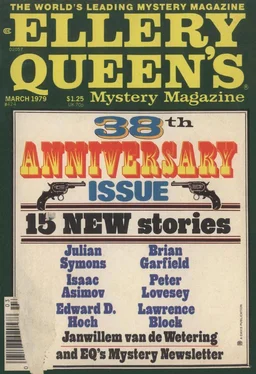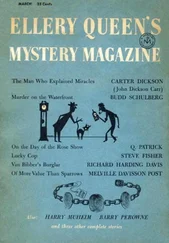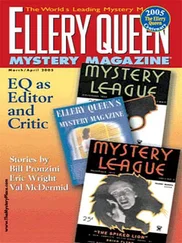Isaac Asimov - Ellery Queen’s Mystery Magazine, Vol. 73, No. 3. Whole No. 424, March 1979
Здесь есть возможность читать онлайн «Isaac Asimov - Ellery Queen’s Mystery Magazine, Vol. 73, No. 3. Whole No. 424, March 1979» весь текст электронной книги совершенно бесплатно (целиком полную версию без сокращений). В некоторых случаях можно слушать аудио, скачать через торрент в формате fb2 и присутствует краткое содержание. Город: New York, Год выпуска: 1979, ISBN: 1979, Издательство: Davis Publications, Жанр: Детектив, на английском языке. Описание произведения, (предисловие) а так же отзывы посетителей доступны на портале библиотеки ЛибКат.
- Название:Ellery Queen’s Mystery Magazine, Vol. 73, No. 3. Whole No. 424, March 1979
- Автор:
- Издательство:Davis Publications
- Жанр:
- Год:1979
- Город:New York
- ISBN:ISSN: 0013-6328
- Рейтинг книги:3 / 5. Голосов: 1
-
Избранное:Добавить в избранное
- Отзывы:
-
Ваша оценка:
- 60
- 1
- 2
- 3
- 4
- 5
Ellery Queen’s Mystery Magazine, Vol. 73, No. 3. Whole No. 424, March 1979: краткое содержание, описание и аннотация
Предлагаем к чтению аннотацию, описание, краткое содержание или предисловие (зависит от того, что написал сам автор книги «Ellery Queen’s Mystery Magazine, Vol. 73, No. 3. Whole No. 424, March 1979»). Если вы не нашли необходимую информацию о книге — напишите в комментариях, мы постараемся отыскать её.
Ellery Queen’s Mystery Magazine, Vol. 73, No. 3. Whole No. 424, March 1979 — читать онлайн бесплатно полную книгу (весь текст) целиком
Ниже представлен текст книги, разбитый по страницам. Система сохранения места последней прочитанной страницы, позволяет с удобством читать онлайн бесплатно книгу «Ellery Queen’s Mystery Magazine, Vol. 73, No. 3. Whole No. 424, March 1979», без необходимости каждый раз заново искать на чём Вы остановились. Поставьте закладку, и сможете в любой момент перейти на страницу, на которой закончили чтение.
Интервал:
Закладка:
In the nursery years that many psychologists think the most important of our lives, Hilary was cared for by big-bosomed Anna, who washed and bathed him, wiped his bottom when he was dirty, and read to him endlessly the stories of Beatrix Potter. Peter Rabbit, Squirrel Nutkin, and Samuel Whiskers, Pigling Bland and Jeremy Fisher, became figures more real to the small boy than his own parents.
And brooding over all these nursery characters, rather as Hilary’s father brooded with angry discontent over his unsatisfactory household, was the farmer Mr. McGregor, who had put Peter Rabbit’s father into a pie, and whose great foot could be seen in one illustration about to come down on Peter. Anna read and Hilary shivered, finding in the figure of the farmer an image of his own frightening father.
Childhood does not last forever, but there are those who cling to childish things rather than put them away. Hilary went up to Oxford — which to Johnny Mannering was still the only possible university — in the early Sixties, just before the days of the Beatles and permissiveness. There he displayed the collected works of Beatrix Potter on his shelves beside books more fashionable for an undergraduate.
“But, my dear, these are the existential masterpieces of the century,” he said in his pleasant, although thin and slightly fluting voice. “The passions, the deceits, the poignancy of it all — really Proust and Joyce are nothing to it.” Beatrix Potter gave him the only celebrity he achieved at Oxford. He joined two or three radical groups and left them within a few weeks, did a little acting but could not remember his lines, had three poems published in a little magazine.
He had just one friend, a broad-shouldered blond puzzled-looking Rugger blue named Charlie Ramsden, who had been at Hilary’s public school, and had always regarded him as a genius. This view was not changed when Hilary took as poor a degree as his own, something they both attributed to the malice of the examiners. Hilary, on his side, treated Charlie with the affectionate superiority one might give to a favorite dog.
“You must meet Charlie,” he would say to new acquaintances. “He’s terribly good at rugby football.” Charlie would smile ruefully, rub his nose, and say, “’Fraid I am.” They were really, as the acquaintances remarked with astonishment, almost inseparable. Not long after he came down, Hilary surprised his friends, not to mention his parents, by marrying a girl he had met in his last year at Oxford. Joyce was the daughter of an old and enormously rich family, and the wedding got a good deal of attention from gossip writers. Charlie Ramsden was best man.
The marriage was six months old when Johnny Mannering, driving home with Melissa after a party, skidded on an icy road and went over the central barrier into the lane of oncoming traffic, where his car was hit head on by a lorry. Both Johnny and Melissa were killed immediately. At the age of 25 Hilary found himself the distinctly rich owner of the family business. Within another six months his marriage had ended.
Hilary never told anybody what was in the note that Joyce left on the drawing-room mantelpiece of their house in Belgravia, beyond saying that she had done the boringly conventional thing as usual. There was no doubt, however, that she had gone away with a man, and his identity did cause surprise. The man was Charlie Ramsden.
Hilary divorced Joyce, she married Charlie, and Joyce and Charlie settled in South Africa where he became a farmer. Those closest to Hilary (but nobody was very close to him) said that he recovered from the loss of Joyce, but that he never forgave Charlie Ramsden. He never mentioned either of them again.
In the years that followed he gathered the biggest collection of Beatrix Potter manuscripts, first editions, and association copies in the world, put up money for a radical magazine with which he became bored after a couple of issues, and for two plays both of which were flops. He traveled abroad a good deal, sometimes in the company of young actors who appeared in the plays. In Amsterdam, on one of these trips, he met Klaus Dongen.
Klaus was half Dutch, half German, a revolutionary terrorist who believed that destruction of all existing national states must precede the advent of a free society. His group, the NLG or Netherlands Liberation Group, claimed credit for half a dozen assassinations including one of a prominent Dutch politician, for a bomb that blew up in a crowded restaurant, and another in a shopping center that killed 20 people and injured twice that number.
Klaus was not interested in Hilary’s ideas, but in his money. Hilary was not interested in Klaus so much as in his NLG associates who seemed to him as fascinatingly dangerous as panthers, perfect associates for somebody named Hilary Engels Mannering. It was through Klaus that Hilary got in touch with young men and women of similar beliefs in Britain. He did not take them on trust. Each of them was required to perform an illegal act — arson, theft, violent robbery — before acceptance into the BPB. What did BPB stand for? The Beatrix Potter Brigade.
It was Hilary, of course, who had chosen the ludicrous name, and he had gone further, giving members of the group names of characters in the stories and insisting that they should wear appropriate masks when carrying out group exploits. Among their achievements were a bomb planted in a Cabinet Minister’s house (it exploded, but everybody was out), a fire bomb that had burned down most of a large London hotel, and a payroll robbery from London Airport.
Hilary himself stayed in the background, interviewing possible new recruits and setting them tests which some refused to undertake. He would then explain that he was a theatrical producer who had been testing their reactions (which was true enough in a way), and pay them off with ten-pound notes. The enterprise had the elements of theatrical childishness that he loved, and for three years now it had completely absorbed him.
On the afternoon of the unsuccessful attempt in Kensington Gardens the members of the group gathered in an extension of Mannering’s wine cellars that ran below the Thames near London Bridge. They entered by a door in an alley, which led to a passage and a storeroom. In the storeroom a perfectly camouflaged door led to a single large windowless room.
There were wine racks along two walls with dusty bottles in them. On the other walls were prints of Beatrix Potter characters — the cat Simpkin buying food for the tailor of Gloucester, Mrs. Tiggy-winkle the hedgehog in her kitchen, Pigling Bland on the way to market, and of course Peter Rabbit who was shown escaping from Farmer McGregor’s attempt to catch him with a sieve. The ceiling was low and the lighting came from lamps invisibly sunk into it, so that the effect was one of mysterious gloom. There was only one visible door, which was said to lead directly to the Thames.
“It’s romantic,” Klaus Dongen had said when he saw it. “And ridiculous.”
“And safe,” Hilary had replied.
There were ten of them besides Hilary, and he waited until they all arrived, refusing to listen when both Peter Rabbit and Simpkin tried to tell him what had happened. Hilary was now in his late thirties, a tall thin man with a sharp nose and a mouth perpetually turned down at the corners as though he had just tasted something bitter. He was older than the rest of them, and although his fluting voice had something absurd about it, he seemed in some indefinable way dangerous. His restlessness, his jerky movements, the sudden grimaces intended as laughs, all gave the impression that he was inhabited by some violent spirit which he was only just able to keep under control.
“Now that we are all here,” he said at last, “I should like a report on what happened. Peter, you were in charge of the operation.”
Читать дальшеИнтервал:
Закладка:
Похожие книги на «Ellery Queen’s Mystery Magazine, Vol. 73, No. 3. Whole No. 424, March 1979»
Представляем Вашему вниманию похожие книги на «Ellery Queen’s Mystery Magazine, Vol. 73, No. 3. Whole No. 424, March 1979» списком для выбора. Мы отобрали схожую по названию и смыслу литературу в надежде предоставить читателям больше вариантов отыскать новые, интересные, ещё непрочитанные произведения.
Обсуждение, отзывы о книге «Ellery Queen’s Mystery Magazine, Vol. 73, No. 3. Whole No. 424, March 1979» и просто собственные мнения читателей. Оставьте ваши комментарии, напишите, что Вы думаете о произведении, его смысле или главных героях. Укажите что конкретно понравилось, а что нет, и почему Вы так считаете.












